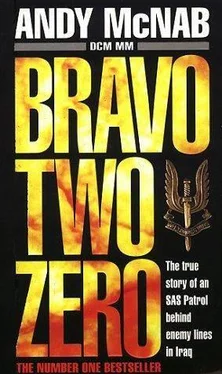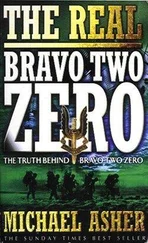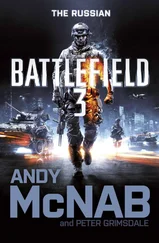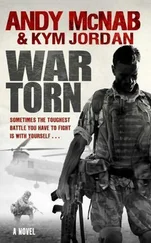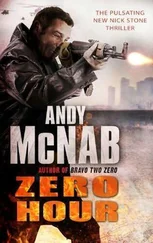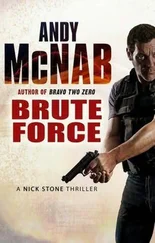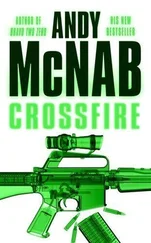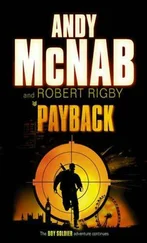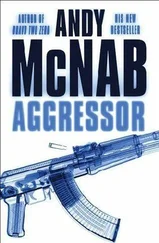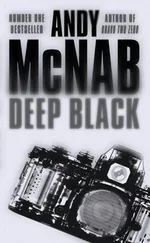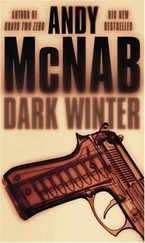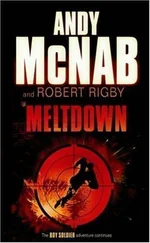There were no smiles this morning. The guards were accompanied by a young officer, who pointed at me and said, “You-you come with me.”
He had a white bandage blindfold that he put around my eyes. My hands were cuffed in front of me, and a blanket was put over my head. Escorted by guards, the officer started leading me away from the prison. He held my arm under the blanket and dragged me along. I looked down through my blindfold and watched the ground. We went through the gate, stopped awhile while he spoke to somebody, then carried on.
We were moving fairly fast when he walked me straight into a lamppost.
The surprise of it knocked me over. My nose started to pour with blood. He thought it was brilliant. We went into a building, up some stairs, and into a room. I was pushed up against a sideboard and told to sit down and cross my legs, facing the wall. The doors closed. I didn’t have a clue what was going to happen next, but assumed the worst. A minute later the blanket and blindfold were ripped off, and I was told to stand up and turn around.
I was in an office. The lighting was strong and harsh. There was a chair against one wall and a video camera set up facing it, with a microphone on a boom. Now I knew why they had stopped hitting my face.
I was facing the prison governor. When he saw the state of my nose, he went ape shit with the young rupert. I was in shit state to look at anyway, so I don’t know what difference a nosebleed made. They took me next door to a sink and told me to wash off the blood. I used the blindfold as a flannel. I was then given a comb and a mirror and told to tidy up my hair. There was nothing I could do to it. It was just too matted with old blood.
It was the first time I’d seen my face since I left the FOB. I looked like Ben Gunn after somebody had taken a shovel to his face. I had a dirty, scruffy beard and the skin was flaky. My mouth was scabby. I couldn’t believe they were going to use me in a video. I cleaned myself up a bit to make them happy, but not too much: I didn’t want to look too healthy for my public.
I sat in front of the video, thinking hard about an appropriate way of showing that I was doing this against my will. I remembered that during the Vietnam War, people were going back to the States and getting persecuted purely because they’d signed something or said something to save their life or that of somebody else. People learned that they should do something that was out of the ordinary while they were exposed to the media, or do their signature with their left hand, so anyone knowing them would recognize that something was wrong.
I decided that I would try for as long as I could to keep my right index finger straight and constantly bring it up to stroke my left eye, under the pretext that my eye was hurting after walking into the lamppost.
I sat and waited. A jundie appeared with three glasses of tea and offered me one.
“We’re going to ask you some questions, Andy,” the major said. “I want you to answer them truthfully for the camera. Then, who knows, maybe you might go home soon.”
“Oh, thank you very much.”
He asked all the questions they’d asked before. Name, number, rank, date of birth, religion. Details of the helicopter and COP platoons, and what we were doing in Iraq. There was a bloke wearing dark glasses behind the camera, behind the lights, whose face I couldn’t see properly. He would talk in Arabic into the speaker system on the video, then ask the question in English. I would answer, and he would translate. I kept rubbing my eye with my finger and never looked directly to camera. I tried all the time to make myself appear drowsy and incoherent. It was worth a go. Either I’d get away with it or they’d give me a bit of a slapping. In fact they didn’t react to it at all.
“That’s it,” the major said after about twenty minutes. “You’re going back now.”
As I got up to leave, the fellow with dark glasses said, “You know your side will never win, don’t you, Andy?”
“Why’s that?”
“Because you’re far too technical.”
I was blindfolded and taken back to the prison and put into another cell on my own. I was depressed. I thought that now they’d done the film I was going to spend the rest of my time in solitary.
The guards went into the cell with the blindfold in their hands and said to Dinger, “You’re next.”
Dinger took one look at the blood on the bandage and roared: “Fucking hell!” He thought that either I had been slotted, or it was all going to happen again. Either way, if they were going to do it, they’d have to do it to him in the cell right there and then. There was what Stan later called a “bit of a scuffle” until other guards rushed in and put guns to their heads. They led him away, and Stan thought: And then it’s me.
In front of the camera Dinger was given a cigarette. When it came to smoking, Dinger was very much a man of the thumb and forefinger school, but in front of the camera he smoked elegantly with the middle fingers of his left hand, like some character out of a Noel Coward play.
Stan decided that he would stroke his hair continuously with both hands and look down at the ground. While he was being interviewed, I got moved back in with Dinger. We tried to work out why we’d done these videos. We prayed that they were going to be shown to the media, so people back home would know we were alive.
We talked to the guards as often as we could about their families.
“How many children do you have? Do you miss them? Do you see them?”
I landed up scoring with Jeral. He was really skinny and young, in his early twenties. His English was very good; he spoke as if he was apologizing, with his shoulders shrugged up.
“I’m a drummer really,” he said. “I play for a group called Queen at the Meridien Hotel in Baghdad.”
His favorite groups were Boney M and Michael Jackson, and every time he saw me he’d start singing, “He’s crazy like…”
“Oh Andy, I want to come to London,” he said to me one day. “When I come, will you show me London? I want to play in a hotel there.”
“Yeah, sure,” I shrugged, “once the war is over we can be friends. You can come to London.”
“Yes Andy, I love you.” He stared longingly into my eyes. “I love you.
Do you love me?”
“Yes, I love you too, Jeral.”
I got a fearsome slagging from the other two the moment he left.
“I’ll give you a month’s pay if you let me watch,” Dinger said.
“Give me a year’s money, and I won’t tell the squadron,” said Stan.
Jeral was a nuisance, but we did get extra bread and little tit bits of information from him. At some stage there was an initiative by the Kremlin, and Jeral said, “The war’s going to be over soon. Gorbachev’s going to organize everything.”
There was indeed some sort of peace initiative, because we heard lots of chanting in the streets and small-arms fire. Some guards burst in, and Jeral said, “The war’s over!”
“How do you know?” I asked.
“Saddam Hussein has signed a treaty. He has explained to the nation that he cannot let so many of the enemy die. He is a very compassionate man.”
Our gauge of whether he was bullshitting or not was whether there was any bombing that night. In fact there was. Jeral wasn’t correct that time, but he did tell us when the ground war started.
Stan got on quite well with a sergeant major who couldn’t speak a word of English. There was some sort of affinity between the two of them, and Stan would speak to him through another of the guards. He would ask how many children he had. It turned out he had two wives and five children. Stan said: “Oh, very strong man,” and the man loved it.
We did have some slight problems with the guards. We’d get filled in now and again while we were taking the bucket down. They’d make sure you were on your own, then come and pick on you. On one occasion they made Dinger do a Michael Jackson moon dance We just let them get on with it. It was just a kicking and a few punches. You’d go down, they’d have their little laugh, and that was that.
Читать дальше
